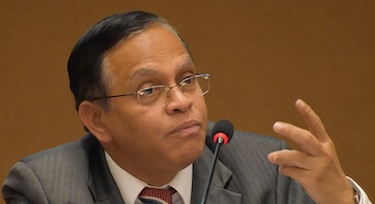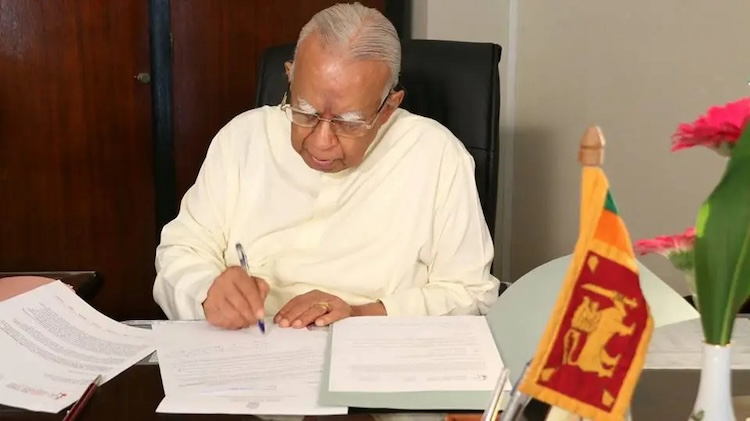By A. L. A. Azeez*
COLOMBO, Sri Lanka | 4 July 2024 (IDN) — Many people now speak and write about the late R. Sampanthan, the leader of Tamil National Alliance in Sri Lanka, following his passing recently. Much of it is a glowing tribute—sorrowful and deeply touching. But the irony is that not all who express themselves now have said positive things about him when he was alive. So, some of the expressions are mostly ex post facto—perverse, yet poignant.
At one level, all this speaks to the decency that the civilised world is known for. You say only about good things a person has done before his or her death, and avoid saying anything negative about the person’s life. At another level, especially in contexts like Sri Lanka’s, it signifies to some extent the hypocrisy characteristic of national political life.

You never say anything positive about the person when the person lived, But you say it now because you are ‘happy’ that the person is no more. Perhaps, a sense of ‘Schadenfreude’!
Sampanthan is no more. And at no time in Sri Lanka’s history can another Sampanthan arrive on its political landscape ever. He strode the political arena like a Colossus, ‘unafraid and unbowed’, to borrow from another source.
He was a force to be reckoned with on all matters—politics, peace and security, law and justice, and development. In all of these, his views were bold, unambiguous, straightforward, and persuasive at the same time. So were they across the national political mainstream. And even more so across the Tamil polity or the realm of minority politics.
Oftentimes I have listened to Sampanthan’s speeches—those he made in parliament and elsewhere. In my previous career, I always took interest to know from friendly or familiar delegates visiting Sri Lanka who were meeting party leaders, feedback of their meetings on matters of foreign policy concern. I heard them often say that Sampanthan’s views were cogent, categorical and consistent irrespective of the number of times they had met him.
Courage of conviction, power of persuasion, and the weight of authority
All this would attest to the fact that he always had the courage of conviction, power of persuasion, and the weight of authority on Sri Lankan political affairs. He was wedded to a cause, and that cause was to serve the interests of his people. However, as time evolved, he expanded the cause to also include clamouring for the rights of marginalised and underprivileged from the South as well. He spoke about the problems that the Tamil youths faced, but used to highlight the importance of empowering all youths, from all communities.
From 2015 to 2019, Sampanthan was engaged on all fronts, assisted by Member of Parliament M.A. Sumanthiran, to achieve a peaceful resolution of the ethnic issue and to address other challenges faced by the country both in the domestic and external contexts within an aspirational constitutional framework which they stressed should rest upon the vision of “undivided Sri Lanka”. Interestingly, they articulated their strong preference for building ‘national consensus’ if the solution found was to be durable and credible.
During this period, the late Mangala Samaraweera served first as the Minister of Foreign Affairs, and then as the Minister of Finance. Due to my active involvement in the EU GSP + preparatory process which required that Sri Lanka make progress in the implementation of commitments it had undertaken under various international treaties in the fields of human rights, labour, environment and governance, it fell to me and my colleagues to consult frequently Samaraweera in his capacity as Minister of Foreign Affairs and Dr. Harsha de Silva, Deputy Minister of Foreign Affairs. The latter of course did much of the political groundwork to ensure that timelines were promptly met and updates furnished to the EU side in time.
The question of addressing issues relating to reconciliation and accountability was a recurring theme in many bilateral and multilateral consultations during that period. Off-sessions, Minister Samaraweera used to mention to all present, that he believed that if a solution to the ethnic issue was ever to be found, it would have to be during the lifetime of Sampanthan.
In 2019, a Sri Lanka Parliamentary delegation visited Geneva to attend an Inter-Parliamentary Union meeting. The delegation included the late Thuraiiretnasingham, TNA Member of Parliament from Trincomalee district. At a social gathering in Geneva, the MP from Trincomalee mentioned how strongly Sampanthan remained committed to achieving a negotiated political solution to the ethnic issue once and for all.
He went on to add that it was Sampanthan’s desire to ensure that Muslims were also accommodated in a political settlement with necessary constitutional guarantees. I understood he was referring to the Muslim community in the North and East of Sri Lanka.
Focus to the year 2000
All these happened within a space of six to seven years. A constitutional coup, an Easter Sunday carnage, an ‘Aragalaya’ (People’s Struggle), a declaration of bankruptcy, and many more have intervened, or supervened during this period. All were undoubtedly tragedies of sorts.
This said, to better understand the man and his political vision, one may have to turn the focus to the year 2000. The then government was preoccupied with the preparation of a new draft constitution. It was the government’s belief that the new draft reasonably accommodated the interests of minorities while protecting the rights and privileges of the majority.
But pressures were mounting on the government and other parties that negotiated with it, from both within and outside parliament, to abandon the draft altogether. A usual trick up the sleeves of politicians was to amplify the concerns of one or the other community against constitutional proposals which they perceived would affect their own interests as well as the interests of ‘people’ whom they claimed to represent.
The late M.H.M. Ashraff who was then shedding the communal political identity manifested in his party, Sri Lanka Muslim Congress, and was starting a new national political formation called ‘National Unity Alliance’ and Sampanthan who had seen several failed efforts to reform the constitution in the past, reached out to each other to develop a shared understanding. They worked together, apparently to ensure that any failure in constitution-making was not blamed on either of them or their respective parties.
They agreed to negotiate with the government with a view to mutually accommodating in a new constitution some of the vital interests they represented, thereby stepping back from original hard-line positions they held on issues such as power-sharing in the North and East.
As it turned out at last, with no significant opposition from any of the minority communities to the draft constitution, the UNP, then in opposition, was left with no fig leaf. The draft constitution was put to torch within the well of the House!
Paradoxically. we live in an era today when Ashraff is no more, Mangala Samaraweera is no more, Thuraiiretnasingham is no more, and Sampanthan is no more.
Sampanthan’s loss is one in this series of national tragedies that has gripped Sri Lanka as stated earlier. It is so even as it happened due to natural causes. Because as a nation we have collectively failed a decent soul that wanted to see a new Sri Lanka—one at peace with itself—emerging, before he breathed his last.
*A. L. A. Azeez is former Permanent Representative of Sri Lanka to the UN in Geneva. [IDN-InDepthNews]
Photo: Former Sri Lanka TNA leader R. Sampanthan. Source: Colombo Telegraph.


